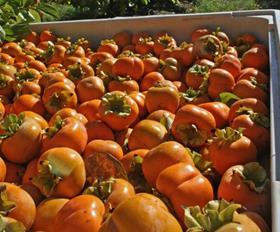
The South African sharon fruit harvesting season has started with the packing on Friday (27 March) of the first fruit at the Arisa packing facility in Buffeljagsrivier in the Southern Cape.
The start of the season marks a period of increased job opportunities in the orchards of the Southern Cape, as well as at Arisa and the returns generated from export and sales to the local market are regarded as a major boost for the region’s rural communities.
The quality of the 2015 fruit is reported to be excellent following good growing conditions during the summer and Arisa expects to pack around 7,000 tonnes of the fruit.
Apart from increasing market share in its main market of western Europe, the South African industry is also looking towards taking advantage of having gained access to the US market last year. Only a limited number of containers were exported to the US in 2014 as shippers adjusted to the rigorous import protocol imposed by the US authorities.
“We were very successful with those shipments and we look forward to increasing shipments this year,” said Sharon Fruit South Africa’s project manager, Pine Pienaar.
The industry is also enjoying success in building its market share in South Africa. In recent years special market development and capacity building projects in the informal sector have exposed many more South African consumers to what is normally regarded as a fairly new project.
“We extended our market development programme to the Western Cape last year, after initially launching it in Gauteng. This year we will also include the Durban region,” said Hein Smal of Mor International in South Africa (MISA).
Sharon Fruit was introduced into the South African fruit industry some 20 years ago by the Israeli company, Mor International, who commissioned the first central packhouse and also invested in extensive plantings. Since then the fruit has found a very special niche in fruit production in South African – the only country in the Southern Hemisphere where it is grown.
The Southern Cape region has been specially selected because of it ideal climate and growing conditions in order to supplement volumes grown during the counter season in the Northern Hemisphere. “The excellent climate of South Africa’s south-western regions is just what sharon fruit needs to deliver the best tasting fruit, bursting with juice and flavor,” said Pienaar.
After a period of consolidation during the past few years when production was focused on only the best climatic conditions of the Southern Cape, the industry is ready for a new period of growth.
“We have a great deal of confidence in the future of the sharon fruit business in South Africa,” said Mor International executive Meir ben Artzy. “Our investment in both the trade and consumer education programmes in South Africa is proof of our commitment. With access into new markets such as the US and the Far East there is much scope for further growth.”
The new season continues till the middle of July. The first export containers are expected to leave Cape Town shortly.



